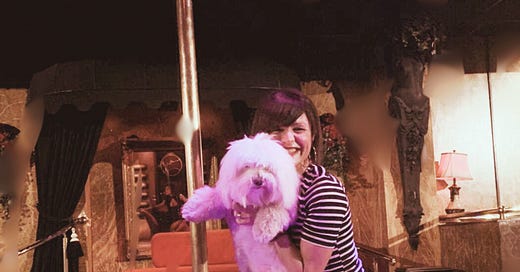The Strip Club Diaries: What I Learned in the Back Office
Wednesday Wisdom: Midweek Reflections
Not many would guess that in a former life, I managed the admin department of a world-famous strip club. That’s right—me, Mrs. Purity Queen. At the time, I was striving to become the next big thing in the inner growth field, looking for a part-time job that would allow me the time and space to focus on all things soulful. So when an agency reached out, telling me that a very wealthy American businessman was looking for a professional and mature administrator to run by themselves his affairs in London, I was tempted. After discussing it with my husband, we both agreed that although it was an unlikely job for someone as prudish as I am, it might surprise me in a good way—while also paying me extremely well and giving me plenty of free time.
And surprised, I was—time and again.
I was never allowed in the club (apart from when my boss agreed to take a picture of Zhibbi and me attempting a little routine), as my presence was strictly required in the back office between the hours of 11 a.m. and 3 p.m., after which I would return to my tidy little life and grand plans. Nor was I to share my spiritual insights with any of the staff. 'Ella, you really don’t want to open these cans of worms. Not everyone here is ready to descend into their own depths,' I was warned a few times. My primary role? Handling chargebacks—disputes from clients trying to claim their money back. And dealing with the press whenever they rang, chasing a scoop.
During my brief time there, I spoke to many different people, each with a unique story.
There was the married man who took off his wedding rings before a dance, only to call the office in tears the next morning: “Where is my ring? My wife will kill me. Please, you gotta help me!” And the man who claimed he had been abused by dancers and staff—certain there was no way he could have spent a hundred grand in a single night. 'Sorry, sir, we have you on camera. You were stuffing someone's bra with notes,' I sternly warned the shameless chancer.
And then, of course, there were the women. The dancer who had gotten herself into debt pursuing a degree in science and decided that using her anatomy for extra cash wasn’t the worst idea. The bored city worker who dropped by after the office because their 9-to-5 lives felt soul-crushing. The single mother trying to create a better future for her child. Were these sad stories? Who was I to say, with my soulful approach to life? Beautiful or not, these women had made a choice, and I was not there to analyse, pity, or change it. Rather, I felt like the recipient of their unique journeys.
One story that stuck with me was about the veteran dancers, who claimed business had changed drastically when a wave of Eastern European performers arrived, making it harder to earn the same money. When they eventually decided to leave nightlife behind and pursue sunnier paths, something curious happened—they all stopped menstruating for a year. As if their bodies, once in sync with an environment driven by desire and power, were moving them toward a new way of being.
What I learned during this unexpected chapter of my life is that people don’t need us to make them into victims to rescue.
They will smell a mile away when we are acting out of our own personal agenda. At the time, the club was under attack by a determined group of feminists who were convinced our dancers were being exploited, got the authorities involved, and did everything in their power to shut us down. In their eyes, they were giving these women their dignity back. But here’s what they failed to see: our dancers did not want to be saved. They wanted to dance.
Whether they were paying university fees, chasing a thrill, or sending money back home, they had made their choices—even if those choices involved their bodies, even if those choices may have been questionable. But we crave boogeymen. We want the sad story where victims and villains stand on opposite sides. The fairy tales where the hero swoops in to rescue the helpless damsel in distress. Yet real life rarely plays out in extremes. It exists in thousands of shades of gray.
'Hello, madam. I’m so-and-so from Bla Bla News. I only have a couple of questions about the trial. What’s your stance? Have you spoken to any of the girls yet?'
The press asked the same questions every time they rang my office.
No, I had not spoken to the girls—because I didn’t need to. It was business as usual at the club, just as it was in every other club we ran.
And as for me, Sister Mary Modesty? I left with more than just an unusual entry on my CV. I left with a deeper understanding of human nature: the realization that not everyone is waiting to be rescued—and that, sometimes, the only person looking for salvation is ourselves. Whenever I spoke to the ‘rescuing women,’ a sense of dread came over me. Their personal stories had become entangled with their purpose, no matter how well-intentioned it was. The abuse that some of them had once suffered had dangerously leaked into someone else's story, forcing it to have the happy ending they never got.
The recent events around the world and our reaction to them, have brought to light the undeniable need to own our story and process it before we set out to rescue the world. Too often, I detect contempt and toxicity even in seemingly gracious words. Too often, the distressed damsel is a big, fat wolf in disguise.





